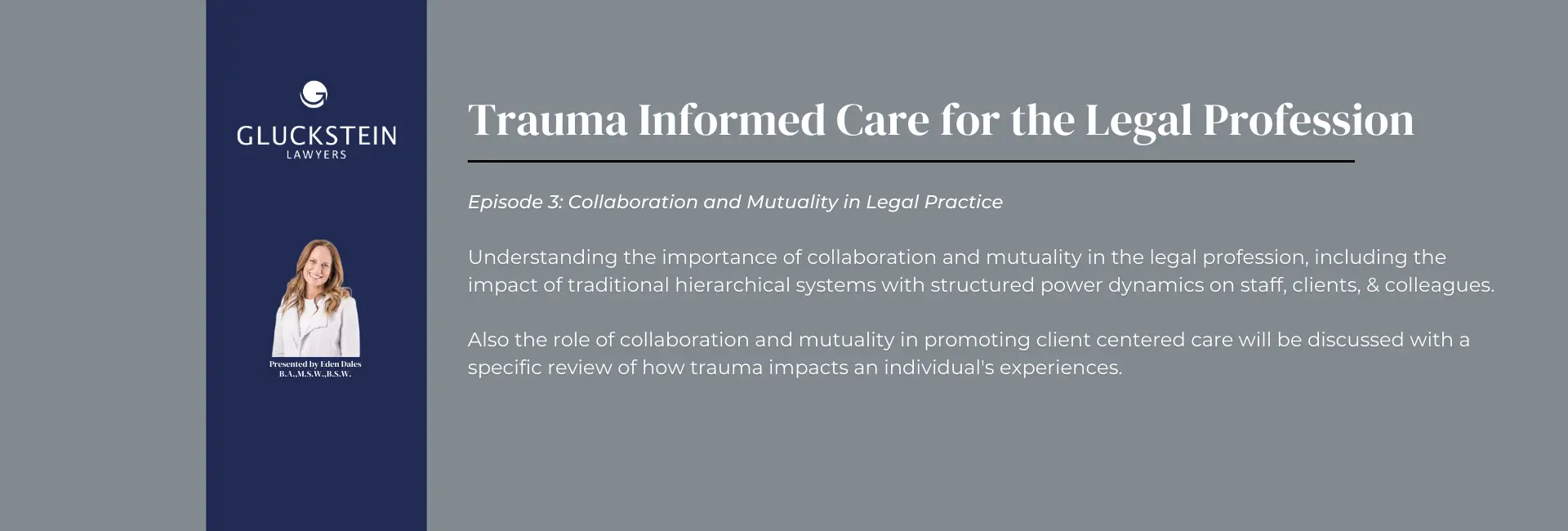
Trauma Informed Care for the Legal Profession Webinar Series: Episode 3: Collaboration and Mutuality in Legal Practice
"Trauma Informed Care for the Legal Profession" is a 6 part webinar series, focused on the core concepts of trauma informed care (Safety, Trustworthiness and Transparency, Peer Support, Collaboration and Mutuality, Empowerment and Cultural, Historical and Gender Issues).
The webinar will include evidence supporting the relevance of this model, and review how trauma is experienced and the impact of trauma on every day life. The science and neuro-biology will be reviewed, with references to studies and articles published in academic journals. Learning objectives are specified to meet the Law Society’s definition of Continuing Professional Development (CPD) as a means to maintain or enhance a lawyer or paralegal’s professional knowledge, skills, attitudes and professionalism.
Each episode includes a one hour presentation and 30 min discussion.
Accreditation by The Law Society of Ontario:
This program contains 7 hours and 30 minutes of Professionalism content and 1 hour and 30 minutes of EDI Professionalism content.
Learning Objectives:
- Healthy Personal and Professional Boundaries
- Effective Conflict Resolution and interpersonal effectiveness
- Self-Compassion, mindfulness & empathy for sustainable collaboration
- Emotional Intelligence: Emotional Regulation, Self Regulation, Empathy, Support
- Sensitivity training for interviewing, assessing, relating to others (clients, staff)
- The 4 R's of trauma informed care
- Identifying risk factors for trauma, (developmental trauma, Big & Little "t" trauma)
- The impact of trauma on the brain (function, structure, development) over the lifespan
- Sensitivity training skills to prevent re-traumatization
- A review of Adverse Childhood Event's Scale and relevance to legal profession
- Empathy and Authenticity for transparency in legal practice
- The neuro-sequential model for stress reduction
- Tools for a strengths based model to promote resiliency and desired outcomes
- EDI: awareness of trauma, neurodiversity, diversity and challenging beliefs/ "othering" with a model for risk and harm reduction and inclusion
- Discussion of power imbalance, organizational structure and traumatic aspects of the legal profession and tools for change
Module Three Will Cover:
- Understanding the importance of collaboration and mutuality in the legal profession,
including the impact of traditional hierarchical systems with structured power dynamics on
staff, clients, & colleagues. Also the role of collaboration and mutuality in promoting client-centered care will be discussed with a specific review of how trauma impacts an individual's
experiences.
- How trauma-informed care can promote collaboration with staff, colleagues and clients,
including understanding the impact of those in power on those who may have experienced
trauma, and how to recognize pre-existing power imbalances, with a trauma-informed
approach to promote collaboration and cohesion.
- How trauma impacts executive functioning, neurodiversity, developmental trauma,
addiction, attachment and how these early life experiences can affect daily interactions and
outcomes. Also, a review of repeated trauma and how that impacts daily life, specifically
legal proceedings, will be discussed, with tools for how to support others.
- The importance of self-regulation and self-awareness in legal practice, understanding the
stress response, identifying and responding to distress in self and others, and using the
neuro-sequential model to guide interactions, which promotes mutuality. This includes
recognizing biases, tolerating criticism with a solution focused approach.
- How trauma-informed legal practice can promote collaboration with clients, the risks
associated with the current structure, and steps for systemic, organizational and personal
change.
- Strategies for maintaining collaboration and mutuality with clients, including ongoing
communication, a model for repair, appropriate self-disclosure, addressing power
imbalances, and modeling reflection.
- A model for training and educating others (personally and professionally), mentorship, leadership, and promoting widespread changes for a client centered and trauma informed environment.
Speakers.
-
Eden
Dales, MSW, RSWEden Dales, MSW, RSW is a registered social worker, and the owner and director of Eden Dales Social Work (EDSW), a community- based, trauma-focused social work practice. EDSW is comprised of a dozen registered social workers have expertise in trauma recovery, and conduct assessments, prepare reports, and provide advocacy, brokerage and counselling services to clients in various languages and regions across Ontario. Eden also maintains a private counselling practice in North York, where she lives, for individuals, couples and families. Eden specializes in trauma, stress management, mood management, executive function challenges, concussions, and brain injuries.
